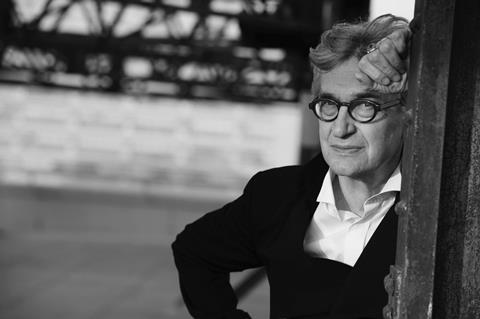Although thrice nominated (for documentary feature), Wim Wenders has never won an Oscar. Could Japanese drama Perfect Days change his fortunes? Screen talks to the revered German filmmaker

Wim Wenders acknowledges that it came as a bolt from the blue to discover he had been chosen as the Oscar contender… for Japan.
“It was a totally unexpected thing,” says the 78-year-old German director, raising his eyebrows at Perfect Days, his drama about a toilet cleaner in Tokyo, being selected to compete for the best international feature Academy Award. “Our friends in Japan, our producers, called to tell me and I thought they were joking.”
Wenders — the revered director of Cannes Palme d’Or winners Paris, Texas, (1984) and Wings Of Desire (1987), and one of the key figures in the New German Cinema movement in the 1970s — attributes the choice partly to the “enormous love” the Japanese public and industry hold for his lead actor Koji Yakusho, star of international hits such as Shall We Dance and 13 Assassins. He speculates the film’s rapturous reception in Cannes’ Competition, where it won the best actor award, may also have influenced the decision.
There was a large crowd at the airport to greet Yakusho on his return from Cannes, says Wenders. “They really love this man. It was the first time he had got an international recognition like this. I think that was what made them send Perfect Days into the Oscar race.”
Wenders was almost equally startled when he attended the ceremony for the guild of German arthouse cinema owners. “They didn’t give the award for best German film, they gave me the award for best foreign picture. That gave me a little taste of what it would mean to be in the Oscar race with a Japanese film.”
Perfect Days — which Neon distributes in North America, and Mubi releases in the UK in February — has made the Oscars’ international feature shortlist of 15 films after the first round of voting. Yakusho stars as Hirayama, a humble, philosophical middle-aged man, who works as a caretaker of Tokyo’s public toilets. He does the job meticulously while finding solace in music, literature and photography.
Wenders’ Japanese co-writer Takuma Takasaki suggested the idea of the toilet cleaner listening to music as he drives to work each morning. His choice of songs ranges from Lou Reed (providing the film’s title) to Nina Simone, The Kinks and others.
The German director was initially wary about imposing his own musical tastes on a Japanese character but Takasaki reassured him, saying, “‘No, excuse me, the stuff that you listened to in the ’70s and ’80s is exactly the same as we listened to in Japan. All the songs you have named so far are the songs Hirayama will have known from his youth because the cassettes are probably 40 or 50 years old.’ He encouraged me to stick to my guns and put [in] the songs that I really liked.”
The screenplay was written with the songs in mind, and Wenders felt the lyrics of Nina Simone anthem ‘Feeling Good’ (“It’s a new dawn, it’s a new day… And I’m feeling good”) captured perfectly the optimism of Hirayama’s character.
The Kinks, meanwhile, provide a link with Wenders’ first feature Summer In The City, which was released in 1971 and is about a former convict trying to make his way in a hostile society. This film was dedicated to the English band and featured a lot of their music.
Fact and fiction

Put it to Wenders that Perfect Days has strong documentary elements while his other Cannes 2023 premiere, feature documentary Anselm, has dramatic traits, and he agrees readily. The latter title — released in the UK by Curzon and in the US by Janus — is a cinematic portrait of the painter and sculptor Anselm Kiefer. Wenders and Kiefer were both born in 1945, growing up in a post-war Germany still badly scarred by the Nazi era. Wenders, who shot the documentary in 3D, uses dramatic recreations to bring Kiefer’s childhood and early adulthood to life.
“For him [Kiefer], everything in the entire world, the macrocosm and the microcosm, signs, mythology, history, poetry and religion were material for painting. There was nothing that escaped painting,” says Wenders, reflecting on what drew him to the controversial artist.
Wenders first met Kiefer when he was editing his 1991 sci-fi drama Until The End Of The World. The two men used to go to the same restaurant. “We got close,” says Wenders. “He took me to see the show he was installing. I saw it unfinished and then I saw it finished and was blown away by it. We talked a lot. Anselm told me he’s also dreaming of making movies… he was a sort of filmmaker in disguise while I was a painter in disguise. The two of us hit it off and we decided we were bound to do something together eventually.”
This was a period when Kiefer was feted abroad but often attacked in Germany, where some were uncomfortable with the way in which he dealt with the legacy of the Third Reich.
Wenders says he is “happy” that it took 30 years for him finally to work with Kiefer. If he had taken on the project earlier, he doubts that he would have had “the tools or the guts” to do the subject justice.
And, yes, he does see some similarities between the hard-driving real-life artist and the fictional Tokyo toilet cleaner. “You can safely say that Anselm is a perfectionist even if he never thinks anything is perfect or finished — sometimes, he does the same painting over and over again until he really thinks he has got it. He is relentless. In that, he does resemble Hirayama who is also very, very dedicated. Of course, Hirayama is very modest and lives in a tiny space — the very opposite of Anselm. But in their dedication, they do resemble one another, absolutely.”
Wenders may once more be in the Oscar hunt, but he remains a passionate Europhile. He was one of the founder members of the European Film Academy (EFA) in the late 1980s and has long described European cinema as “a family that is happier together”. His 1976 movie Kings Of The Road has the celebrated line, “The Americans have colonised our subconscious.” Ask him how optimistic he feels about the idea of a shared European film identity in the face of Hollywood hegemony and he still gives an optimistic answer.
“It [EFA] was born as a club of directors in the very beginning, very much driven by Ingmar Bergman… then it became larger. The contribution of EFA to European cinema is tremendous,” he insists, crediting the organisation with creating the “consciousness that there is something like European cinema”.
European coproduction has now become far more commonplace, he notes. “Very few movies are made out of one national industry alone. That is a lot the signature of EFA. The initial idea of Ingmar became much bigger.”
Wenders also points out EFA has always striven to be inclusive. “The Europe we defined for the membership is Europe in the very largest sense of the word — it included from the beginning Israel and Palestine and used the widest possible map of Europe. I think we’ve contributed tremendously to the consciousness also of the audience that Europe has its own film industry and film art.”
As for his own contribution, the venerable German auteur has no plans yet to step away from directing. “I don’t quite know what is going to happen when I stop making movies,” he says. “I hope I can still continue making a few [more]. I am encouraged by some of my director friends who made their best work after 80. I still like it a lot — and I am still a confessing workaholic!”















![[L-R]: Amanda Villavieja, Laia Casanovas, Yasmina Praderas](https://d1nslcd7m2225b.cloudfront.net/Pictures/274x183/6/4/1/1471641_pxl_20251224_103354743_618426_crop.jpg)









No comments yet